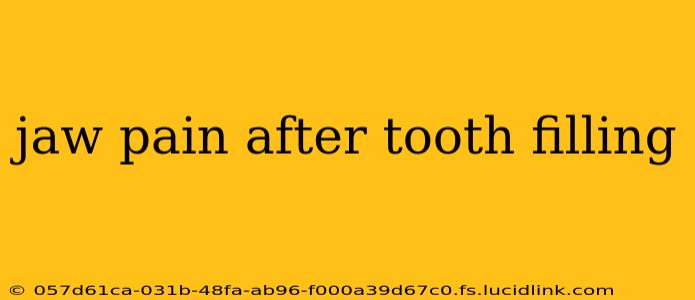Experiencing jaw pain after a tooth filling is a common concern, and it's crucial to understand the potential causes and how to manage this discomfort. While a simple filling procedure usually doesn't cause significant jaw pain, several factors can contribute to this issue. This comprehensive guide explores the various reasons behind post-filling jaw pain, effective treatment options, and preventive measures.
What Causes Jaw Pain After a Tooth Filling?
Several factors can trigger jaw pain following a tooth filling. These include:
-
Inflammation and Irritation: The filling procedure itself, even a minimally invasive one, can cause minor trauma and inflammation to the surrounding tissues. This inflammation can lead to temporary discomfort and jaw pain.
-
Temporomandibular Joint (TMJ) Disorder: The TMJ connects your jaw to your skull. Stress, grinding teeth (bruxism), or even the slight alteration in bite caused by a new filling can aggravate existing TMJ issues or trigger new ones, resulting in jaw pain.
-
High Filling: If the filling is placed too high, it can alter your bite and cause your jaw muscles to work harder, leading to pain and discomfort. This is a common reason for post-filling jaw pain.
-
Infection: In rare cases, an infection can develop after a filling procedure. This infection can manifest as jaw pain, along with other symptoms like swelling, redness, and sensitivity to heat or cold. This requires immediate dental attention.
-
Sinus Infection: If the filling is near the maxillary sinuses (sinuses located in the cheekbones), a pre-existing or newly developed sinus infection can cause referred pain in the jaw.
-
Muscle Strain: The discomfort of the dental procedure itself, anxiety, or clenching your jaw during the procedure can lead to muscle strain, resulting in pain.
How Long Does Jaw Pain After a Tooth Filling Last?
The duration of jaw pain after a filling varies depending on the underlying cause. Mild inflammation and irritation usually subside within a few days to a week. However, pain related to TMJ disorders, high fillings, or infections can persist longer and may require professional intervention. If your jaw pain lasts longer than a week, or if it's severe, you should consult your dentist.
What Can I Do to Relieve Jaw Pain After a Tooth Filling?
Several home remedies can help alleviate mild jaw pain:
-
Over-the-Counter Pain Relief: Nonsteroidal anti-inflammatory drugs (NSAIDs) like ibuprofen or naproxen can reduce pain and inflammation. Always follow the recommended dosage.
-
Ice Packs: Applying ice packs to the affected area for 15-20 minutes at a time can help reduce swelling and numb the pain.
-
Warm Compresses: Gentle heat can also provide relief for some individuals. Try alternating between ice and heat.
-
Soft Foods: Stick to soft foods that require minimal chewing to reduce stress on your jaw.
-
Rest: Give your jaw muscles a rest by avoiding excessive talking, yawning, or chewing.
Does a Tooth Filling Affect Your Bite?
Yes, a poorly placed or excessively high tooth filling can significantly alter your bite. This can lead to jaw pain, headaches, and other problems. If you notice any changes in your bite after a filling, it's essential to inform your dentist immediately.
Can a High Filling Cause Jaw Pain?
Yes, a high filling is a common cause of post-filling jaw pain. The increased height can interfere with your normal bite, causing your jaw muscles to strain and become painful. Your dentist can adjust the filling to resolve this issue.
When Should I See a Dentist About Jaw Pain After a Tooth Filling?
You should seek professional dental care if:
- Your jaw pain is severe or persistent (lasting longer than a week).
- You experience swelling, redness, or fever.
- You have difficulty opening or closing your mouth.
- You notice changes in your bite.
- You suspect an infection.
Preventing Jaw Pain After a Tooth Filling:
-
Discuss concerns with your dentist: Don't hesitate to communicate any anxieties or discomfort you experience during or after the procedure.
-
Choose a qualified dentist: Select a dentist with a proven track record and experience.
-
Follow post-operative instructions carefully: Adhering to your dentist's post-operative instructions is crucial for optimal healing.
By understanding the potential causes, treatments, and preventive measures associated with jaw pain after a tooth filling, you can better manage any discomfort and ensure a smooth recovery. Remember, consulting your dentist promptly for persistent or severe pain is crucial for effective diagnosis and treatment.
